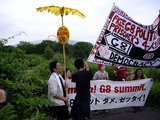
2008-07-13
Report from this year’s summit protests
The protests that follow the annual G8 summit arrived in Northern Japan this year, as the leaders of the world’s eight wealthiest countries gathered at the Windsor Hotel, Lake Toya.
Japan spent a record breaking $280 million on maintaining security at this year’s summit, over double the $130 million spent by German authorities last year. Police were shipped in from all over the country, as a total of 21,000 law enforcers descended on Japan’s most sparsely populated island. With an estimated total of 1,000 protesters attending the demonstrations at this year’s summit, the police presence was described by one demonstrator as “overkill and a waste of public money.”

Activists arriving in Japan to protest were targeted by immigration officials at Japan’s borders, with at least thirty people reported to be have been deported upon arrival, many of those from neighbouring South Korea. Others were subject to lengthy questioning, and held for as long as twenty hours, during which time they were locked in holding cells and deprived of their basic human rights. One activist, who was stopped at Tokyo airport after disembarking a flight from Hong Kong, commented, “Two friends and I were stopped by immigration officials at 7.30pm and were only released at 1pm the next day. During this time, we were held captive, refused food and prohibited from making any phone calls.”
Activists were keen to highlight the repressive nature of the Japanese legal system, which allows arrested individuals to be held by police for twenty-three days without charge, during which time their homes are often raided and families harassed. After police arrested four people at a rally in Sapporo on 5th July, the organisers of protest camps closer to the summit turned their attention to avoiding clashes with police. Many activists felt effective protest against the G8 was rendered impossible by heavy-handed policing and the threat of twenty-three-day imprisonment. One Spanish activist, who requested not to be named, said, “we have seen from the demo in Sapporo that the Japanese police will arrest peaceful protesters at random. People are aware that there is a genuine threat of spending time in prison for peacefully protesting in this country.“
On 7th July, a group of fifty protestors were blocked by a hundred and fifty police as they attempted to travel to a protest near Lake Toya. The protesters, mostly made up of foreign nationals, were making their way towards a train station close to Toyoura campsite, before their progress was abruptly halted. They were ordered to return to their campsite or face arrest, after a police spokesman declared their gathering illegal. The activists, incensed at not being allowed to access local public transport, told the press that this show of repression was a clear violation of their human right to protest. “We are bring held prisoners in our camp”, commented a French protester, “I have never experienced being stopped from travelling to a protest before. The repression in this country is insane.”
The majority of protestors that had travelled from to Japan for the demonstrations felt disappointed by the actions that took place over the three days of the summit, feeling that they fell well short of what was achieved in Germany last year. However, this year’s protests are being seen as a building block for young Japanese social movements, which will have learnt many lessons from the past few days. As one Japanese protester put it, “Although we recognise the frustration of many of the European activists, if you had told me four years ago that we would be able to get this many Japanese people on the streets and host an international protest camp, I do not think I would have believed you.”
The main issue to come out of this year’s summit protests is not in doubt. With deportations, harassment, roadblocks and other forms of state repression the order of the day, Japan has exposed its oppressive policy towards activists. The fact that the state’s right to hold arrestees for twenty-three days without charge has been cast into the world’s spotlight will further dent its reputation. These factors, coupled with the staggering amount of taxpayer’s money spent on repressing such a small number of protesters, have led to the Japanese government being left red-faced and out of pocket, with the protestors looking on to Italy 09.